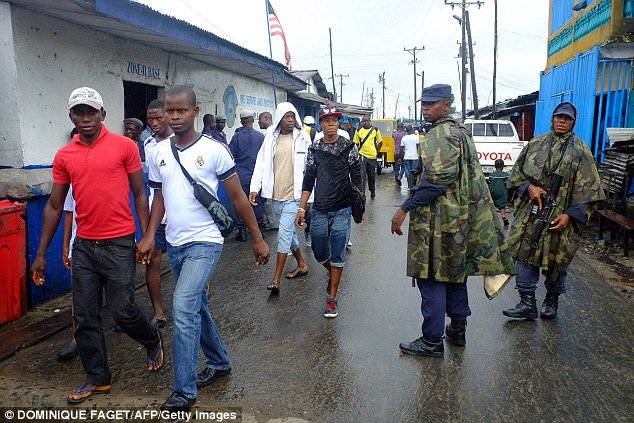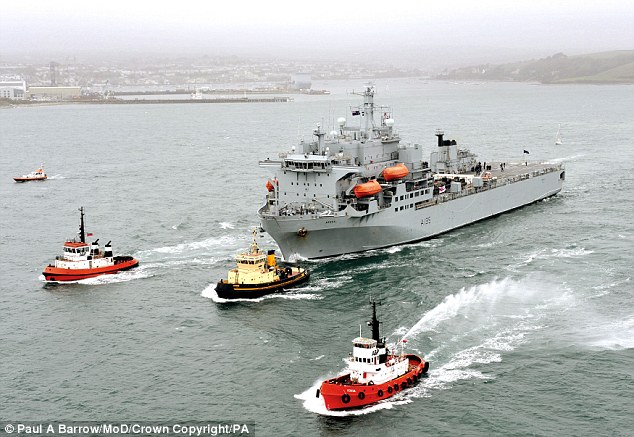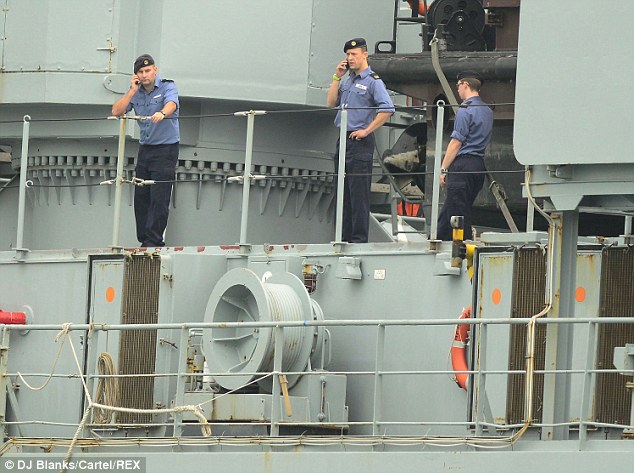Plans drawn up by Britain's most senior army officer could see 3,000 British troops being sent to Sierra Leone to set up military blockades to stop the deadly virus from spreading.
The top-level review comes as charity Oxfam said a critical shortfall of Western military personnel in West Africa was in danger of putting lives at risk. It wants troops to deliver vital supplies and build treatment centres for victims.
But defence sources disclosed last night that options to be considered by Sir Nick go much further and include UK troops deploying to towns and villages deep inside Sierra Leone, which gained its independence from Britain in 1961.
A source said: ‘From a military perspective ebola is like a biological warfare attack and should be countered accordingly. There needs to be a clampdown on human movement inside Sierra Leone and possibly to and from the country between now and late 2015 when it is hoped that an antidote will have been developed.’
Ebola lockdown: British plan to send 3,000 UK troops into Sierra Leone to set up military blockades to restrict movement in attempt to stop the virus spreading
By Mark Nicol for The Mail on Sunday
19 October 2014
Dailky Mail
Thousands of UK troops would be sent to Sierra Leone to enforce a military lockdown under radical plans to defeat ebola being considered by Britain’s most senior Army officer.
General Sir Nick Carter is leading a review of the UK’s response to the virus, and could use 3,000 British soldiers to impose a blockade and restrict human movement in the African country.
Sir Nick, the Chief of the General Staff, will advise Ministers on proposals, including an increase in troop numbers and using Royal Navy ships to patrol its coastal waters.

Royal Marines Commandos carry out duties on board the hospital ship RFA Argus as it prepares to leave its home port of Falmouth for Sierra Leone
The top-level review comes as charity Oxfam said a critical shortfall of Western military personnel in West Africa was in danger of putting lives at risk. It wants troops to deliver vital supplies and build treatment centres for victims.
But defence sources disclosed last night that options to be considered by Sir Nick go much further and include UK troops deploying to towns and villages deep inside Sierra Leone.
A source said: ‘From a military perspective ebola is like a biological warfare attack and should be countered accordingly. There needs to be a clampdown on human movement inside Sierra Leone and possibly to and from the country between now and late 2015 when it is hoped that an antidote will have been developed.’
 These 92 British Army medics arrived in Ebola-ravaged Sierra Leone on Thursday to help tackle the disease
These 92 British Army medics arrived in Ebola-ravaged Sierra Leone on Thursday to help tackle the disease

Liberian soldiers patrol in Monrovia's West Point slum. British troops could be carrying out similar duties if a recommendation by the Chief of the General Staff is approved

Liberian soldiers patrol Dolo's Town, some 60km east of Monrovia, quarantined as a measure to contain the spread of ebola

RFA Argus sailing from Falmouth on Friday. Those on the ship include doctors, nurses, surgeons and Royal Marines in a bid to tackle the ebola outbreak in West Africa
Sir Nick, who led thousands of UK troops in Afghanistan and Iraq, is expected to deliver recommendations by the end of this week. Currently 750 British military personnel are committed to stamping out ebola. The UK has also sent a hospital ship and three helicopters.
Since the outbreak began more than 4,500 people have died from the disease. Experts fear the death toll could rise to a million by July next year.
In a further move, the Government’s health watchdog Public Health England last night released specific advice for pregnant women concerned about contracting ebola, saying research suggested there is ‘limited evidence’ they are at increased risk of severe illness, medical complications and death when infected.

Royal Navy medical ship RFA Argus leaves Falmouth, Cornwall for Sierra Leone on Friday carrying three Merlin helicopters and a crew of around 380
It said: ‘Reported complications include spontaneous abortion and pregnancy-associated haemorrhage. Infants born to mothers who are in the terminal stage of disease are invariably infected.’
Meanwhile, the number of specialist beds available in the UK for ebola victims has been reduced following a legal row over building work at Newcastle’s Royal Victoria Hospital.
Newcastle Hospitals NHS Foundation Trust is withholding payments to the building company Laing O’Rourke Construction after claims that work on a £330million rebuilding project there is not up to standard.
Sir Leonard Fenwick, the trust’s chief executive, said: ‘It means we can’t move to the next stage and build the centre for infectious diseases.’ Laing O’Rourke declined to comment due to legal proceedings.

Crew members of RFA Argus make last minute calls before they sail for Sierra Leone
Read more: 3,000 UK troops in germ warfare-style ebola blockade plan in Sierra Leone* | Daily Mail Online
Follow us: @MailOnline on Twitter | DailyMail on Facebook
Sir Nick Carter, the Chief of the General Staff, will advise Ministers on proposals, including an increase in troop numbers and using Royal Navy ships to patrol Sierra Leone's coastal waters.
The top-level review comes as charity Oxfam said a critical shortfall of Western military personnel in West Africa was in danger of putting lives at risk. It wants troops to deliver vital supplies and build treatment centres for victims.
But defence sources disclosed last night that options to be considered by Sir Nick go much further and include UK troops deploying to towns and villages deep inside Sierra Leone, which gained its independence from Britain in 1961.
A source said: ‘From a military perspective ebola is like a biological warfare attack and should be countered accordingly. There needs to be a clampdown on human movement inside Sierra Leone and possibly to and from the country between now and late 2015 when it is hoped that an antidote will have been developed.’
92 British Army medics, from 22 Field Hospital, which is based at Normandy Barracks in Aldershot, Hampshire, arrived in Sierra Leone on Thursday, where they joined the 40 British soldiers which are already there to run a field hospital near the capital Freetown, which has 12 of its 92 beds set aside for those helping to terat others with the disease.
In addition, the Royal Navy hospital ship RFA Argus left Falmouth for Sierra Leone on Friday, carrying a further 750 military personnel and three Merlin helicopters.
Ebola lockdown: British plan to send 3,000 UK troops into Sierra Leone to set up military blockades to restrict movement in attempt to stop the virus spreading
Chief of the General Staff General Sir Nick Carter heads review of UK response to disease
One suggestion is to use Royal Navy ships to patrol its coastal waters
Oxfam said lack of Western military personnel in West Africa puts lives at risk
Charity wants troops to deliver vital supplies and build treatment centres
One suggestion is to use Royal Navy ships to patrol its coastal waters
Oxfam said lack of Western military personnel in West Africa puts lives at risk
Charity wants troops to deliver vital supplies and build treatment centres
By Mark Nicol for The Mail on Sunday
19 October 2014
Dailky Mail
Thousands of UK troops would be sent to Sierra Leone to enforce a military lockdown under radical plans to defeat ebola being considered by Britain’s most senior Army officer.
General Sir Nick Carter is leading a review of the UK’s response to the virus, and could use 3,000 British soldiers to impose a blockade and restrict human movement in the African country.
Sir Nick, the Chief of the General Staff, will advise Ministers on proposals, including an increase in troop numbers and using Royal Navy ships to patrol its coastal waters.

Royal Marines Commandos carry out duties on board the hospital ship RFA Argus as it prepares to leave its home port of Falmouth for Sierra Leone
The top-level review comes as charity Oxfam said a critical shortfall of Western military personnel in West Africa was in danger of putting lives at risk. It wants troops to deliver vital supplies and build treatment centres for victims.
But defence sources disclosed last night that options to be considered by Sir Nick go much further and include UK troops deploying to towns and villages deep inside Sierra Leone.
A source said: ‘From a military perspective ebola is like a biological warfare attack and should be countered accordingly. There needs to be a clampdown on human movement inside Sierra Leone and possibly to and from the country between now and late 2015 when it is hoped that an antidote will have been developed.’


Liberian soldiers patrol in Monrovia's West Point slum. British troops could be carrying out similar duties if a recommendation by the Chief of the General Staff is approved

Liberian soldiers patrol Dolo's Town, some 60km east of Monrovia, quarantined as a measure to contain the spread of ebola

RFA Argus sailing from Falmouth on Friday. Those on the ship include doctors, nurses, surgeons and Royal Marines in a bid to tackle the ebola outbreak in West Africa
Sir Nick, who led thousands of UK troops in Afghanistan and Iraq, is expected to deliver recommendations by the end of this week. Currently 750 British military personnel are committed to stamping out ebola. The UK has also sent a hospital ship and three helicopters.
Since the outbreak began more than 4,500 people have died from the disease. Experts fear the death toll could rise to a million by July next year.
In a further move, the Government’s health watchdog Public Health England last night released specific advice for pregnant women concerned about contracting ebola, saying research suggested there is ‘limited evidence’ they are at increased risk of severe illness, medical complications and death when infected.

Royal Navy medical ship RFA Argus leaves Falmouth, Cornwall for Sierra Leone on Friday carrying three Merlin helicopters and a crew of around 380
It said: ‘Reported complications include spontaneous abortion and pregnancy-associated haemorrhage. Infants born to mothers who are in the terminal stage of disease are invariably infected.’
Meanwhile, the number of specialist beds available in the UK for ebola victims has been reduced following a legal row over building work at Newcastle’s Royal Victoria Hospital.
Newcastle Hospitals NHS Foundation Trust is withholding payments to the building company Laing O’Rourke Construction after claims that work on a £330million rebuilding project there is not up to standard.
Sir Leonard Fenwick, the trust’s chief executive, said: ‘It means we can’t move to the next stage and build the centre for infectious diseases.’ Laing O’Rourke declined to comment due to legal proceedings.

Crew members of RFA Argus make last minute calls before they sail for Sierra Leone
Read more: 3,000 UK troops in germ warfare-style ebola blockade plan in Sierra Leone* | Daily Mail Online
Follow us: @MailOnline on Twitter | DailyMail on Facebook